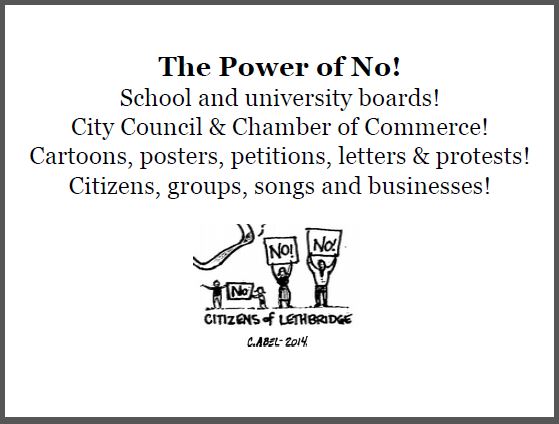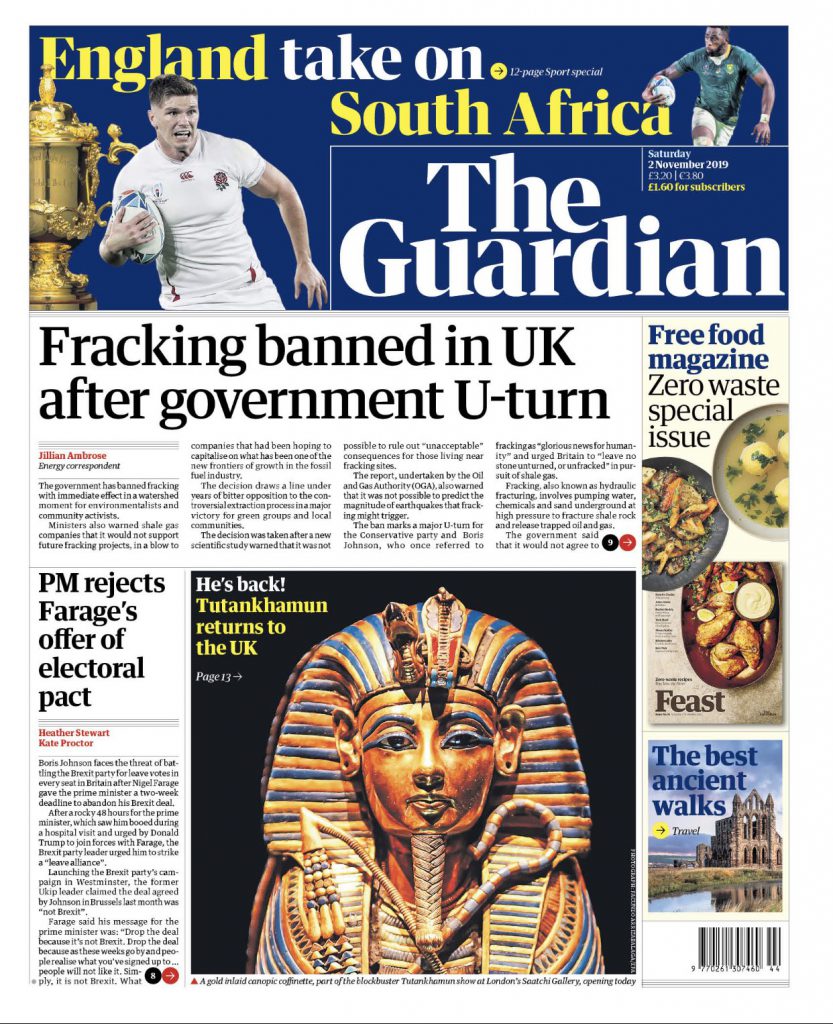2014 05 04: The Power of NO! HUGE VICTORY BY THE PEOPLE, BUSINESSES, COMMUNITY AND CITY OF LETHBRIDGE Alberta: Goldenkey withdraws from Penny Project

Fracking is finished in the UK – thanks to the power of public protest, Creativity, solidarity and determination have stopped the government-backed ‘dash for gas’ in its tracks by Anna Vickerstaff, 5 Nov 2019, The Guardian
On Saturday morning the UK government announced it would be halting fracking in England with immediate effect. Following years of opposition from local communities, the wider public and other major political parties, the Conservative government finally admitted defeat and announced a moratorium. It will, of course, try to claim a moratorium on fracking as a win for itself, but this is a victory for people power.
For eight years, local communities have led this fight. Since work started in Lancashire, 1,032 days ago, local people have been at the gates every single day. From Balcombe to Blackpool, Sherwood to Ryedale, people power has defeated the fracking industry before it got off the ground. This victory is one of the biggest the climate movement has ever seen.
The fight against fracking has been one of the most determined and disruptive in British history. The Preston New Road site was often the flashpoint: the stretch of A-road leading to it becoming a microcosm of hope, where a heady mixture of community strength and international solidarity provoked thousands of activists to block the gates of Cuadrilla’s site.
The campaign employed a variety of tactics. There were responses and interventions in the planning processes as well as public meetings run by the “Nanas” – a group of female activists known for their creative protests – who distributed cakes while inspiring fellow protesters with their passion. Come rain or shine, protesters spent years forming creative and effective blockades at the gates of sites across the country, with hundreds of arrests and one unprecedented and three ultimately unjust prison sentence.
This fight wasn’t just the preserve of environmental activists – it spanned local communities and led to generations of families resisting together.
They were always going to win because they would never give up, driven at their core by love instead of profit.
The government justified this moratorium following a report from the Oil and Gas Authority that found it was impossible to rule out “unacceptable” consequences for communities surrounding fracking sites. It’s important to remember that we’ve known this from the very beginning – this decision is not the result of the shock findings of one report, but the power of a movement that has opposed fracking at every turn. In August, after a fracking-triggered 2.9-magnitude earthquake, work was stopped at the industry’s flagship site in Blackpool. This was tremor number 134 in a 22-day period.
If the industry was really so worried about safety, things would never have got this far.
Some are concerned about it only being a “temporary halt”, but this move is the end of fracking in the UK. Though neither permanent nor perfect on paper, the underlying conditions mean we’ve reached a point of no return. Economically, technically and environmentally, fracking is simply not viable.
Last year a report from Friends of the Earth showed that a staggering 6,000 shale gas wells would be needed to replace just half the UK’s gas imports over a 15-year period. With just one site barely functioning in Lancashire, and existing in a state of purgatory thanks to relentless protest, the industry has proven to be unscalable.
On Monday a further blow to the industry came in the form of the announcement that fracking would not be categorised as “nationally significant infrastructure”. This ruling was another failed attempt by the Conservatives to bypass the planning system and the voices of local people. They had also proposed having fracking classed as “permitted development” – which basically equated the permission required to set up a fracking site with that needed for a garden shed. But again, the tireless activism around the country halted the proposal in its tracks, with 800 councillors voicing their disapproval of the policy after public pressure. This mass public opposition forced the Conservatives into silence, until Monday’s discreet update.
George Osborne signalled the Conservatives’ dogged pursuit of fracking in 2012 with his announcement of a “dash for gas”. When Scotland banned fracking in 2017, Theresa May disagreed with the decision saying fracking “had a role to play” in the UK. Even last year, despite dwindling support, she was still pushing hard for its continuation because of the “impact it can have on our future energy security”. Their threats to weaken regulations and attempts to bypass the planning system signalled their desperation to establish the new fossil fuel industry.
In 2017 the Conservative manifesto called for a “fracking revolution”. That they’re putting a moratorium on fracking in advance of an election two years later, shows how national opposition and a grassroots movement have forced their hand.
The timing of Saturday’s announcement should not be ignored. It would be naive to believe this move wasn’t a strategic ploy to secure marginal seats in next month elections in areas with fracking licences. But that move in itself marks a monumental victory.
Make no mistake, this is a huge win for local campaigners and the final nail in the coffin of the fracking industry in the UK.
The U.K. Should Keep Its Fracking Ban for Good, Britain doesn’t need shale gas to help make the shift from coal power by Leonid Bershidsky, November 4, 2019, Bloomberg
The U.K. government’s temporary fracking moratorium should turn into a permanent ban. Allowing shale gas extraction makes sense only when a country is still phasing out coal, and then only under certain conditions. But the U.K. is almost finished with coal, and fracking can only postpone its transition to clean energy.
… The U.K. government’s move is a pre-election turnabout: The Conservatives have always backed fracking, but it is unpopular with locals pretty much everywhere it’s used, including in the U.S., the technology’s greatest proponent and beneficiary. In the U.K., 40% of the population — the highest share since 2013 — say they’re opposed to fracking, while just 12% support it. But public attitudes shouldn’t be the only reason to impose a fracking ban.
As she announced the drilling moratorium, Energy Secretary Andrea Leadsom spoke of “the huge potential of U.K. shale gas to provide a bridge to a zero carbon future.” But, almost regardless of all the earthquake- and water-supply-related concerns, that potential is highly questionable.
When it comes to carbon emissions, natural gas is certainly preferable to coal. [Not according to the science!] …
… The case made for shale in the U.K. and elsewhere has less to do with moving to clean energy than with importing less natural gas. As conventional gas production on the U.K. continental shelf has declined, imports have been increasing.
Relying on Imports
The U.K.’s own gas production is trending down, while supplies from Norway and LNG imports are growing in importance
The idea is that by developing its own shale gas, the U.K. could increase its energy security and drive down energy prices. But thanks to the shale boom in the U.S. and the recent growth in global liquefied-natural-gas exports, it’s unlikely the U.K. will ever experience a gas shortage — and today’s prices are the lowest in almost a decade.
… The U.K. should ban fracking permanently — and not just because of the tremors. In that sense, the Liberal Democrats and Labour, who support a full ban, are on firmer ground before the December parliamentary election than the Conservatives.
Refer also to:

